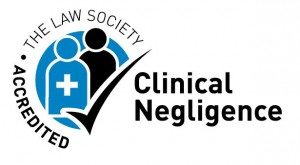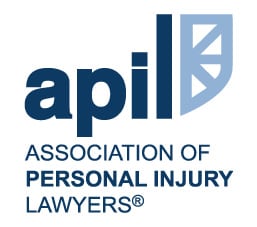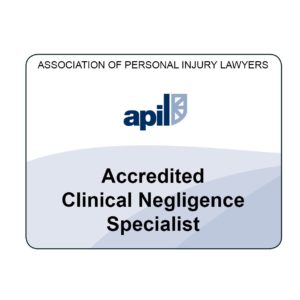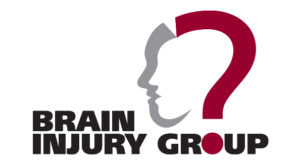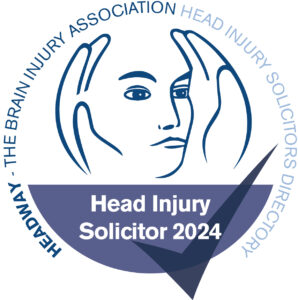The medical negligence team at Lester Aldridge is highly skilled and experienced. They specialise in cases where their clients have suffered injuries as a result of medical mistakes.
Partner Liz Oaten is accredited as a clinical negligence specialist by all three nationally recognised clinical negligence panels: APIL, AvMA and the Law Society Clinical Negligence Accreditation.
You or a family member may have suffered life-changing injuries because of medical negligence by the NHS, your GP, or a private consultant/hospital. We understand you need support, advice, and compensation to rebuild your life.
You may have suffered a serious injury that will require long-term support into the future and, potentially, for the rest of your life.
We are here to help.
What can our medical negligence solicitors help with?
Our specialist team of lawyers can provide expert advice following injuries as a result of many different types of medical mistakes, including:
- Amputation claims
- Birth injuries (to the baby and the pregnant person)
- Brain injuries
- Cancer misdiagnosis
- Cardiology
- ENT claims
- Failure to diagnose or delayed diagnosis of medical conditions
- Fatal cases
- General surgical claims
- Gynaecological injuries
- Mediation errors
- Negligently performed surgery (including cosmetic procedures)
- Orthopaedic injuries
- Sepsis claims
- Spinal injuries, Cauda Equinamed
- Stroke
- Urological claims
Why choose Lester Aldridge for your medical negligence claim?
Lester Aldridge has been handling clinical negligence claims for many years. We will listen to you and take the time to understand how you are feeling and how the negligence has impacted your life and your family.
At Lester Aldridge, we have a specialist team of medical negligence solicitors, including those accredited by APIL (Association of Personal Injury Lawyers), AvMA (Action Against Medical Accidents) and the Law Society. Our team is recognised as experts in The Legal 500.
We are far more than claims handlers. We pride ourselves on providing a client service that is empathetic, client-focused, tenacious and solution-driven. We really do care about our work and the results we achieve for those we represent.
No-win, no-fee solicitors
We know that making a clinical negligence claim can be daunting, and many worry that they will face a hefty legal bill at the end of the process. Our lawyers can deal with your claim on a no-win, no-fee basis, also known as a conditional fee agreement (CFA), backed by insurance. This means there is no financial risk if your claim is unsuccessful. We will happily discuss exactly what this means and how it all works.
How to start your claim
If you need a solicitor for clinical negligence, call us today on 0344 967 0791 for a free, no-obligation discussion. One of our team will take your details and provide you with advice confirming whether you have a claim to make and how we can help you. Alternatively, please fill out the Make an Enquiry form at the top of the page so we can arrange a convenient time to call you.
Memberships and accreditations
- APIL (Association of Personal Injury Lawyers) Clinical Negligence panel
- The Law Society Clinical Negligence panel
- AvMA (Association of Victims of Medical Negligence) Clinical Negligence panel
- SCIL (Society For Clinical Injury Lawyers)
- Brain Injury Group
- Headway – the brain injury association
- Panel Member: Katie Piper Foundation
Frequently Asked Questions
We will be able to offer you a no win no fee agreement, which means that if you lose you don’t pay anything at all. If you win you may have to pay a success fee although we will discuss whether or not you will be asked to pay a success fee at the start and before you enter into the agreement with us. That way you can decide!
In some cases we will advise you to take out after the event insurance and we will be able to advise on that before we get started. The insurance premium is reasonably priced and is only payable if you win and at the end of the case.
It can take a number of years to gather the evidence that you and we need to achieve a final resolution of the claim. Sometimes we have to wait until a medical condition or symptoms resolve before exploring settlement. In claims involving children we may have to wait until the child reaches a certain age to be able to determine what their needs will be in the future. We can give you an idea of the likely timescale of your case at the start.
In most cases, the time for commencing a claim with the court is three years from the date of the negligent act. In some cases, it is three years from the date when you first realise that you have suffered a serious injury due to the negligence of another party. In fatal cases, it is three years from the date of death.
Yes, we can take over your claim from your existing solicitor without any financial implications for you. You just have to sign a form of authority and we do the rest. We are able to take over cases that have legal aid funding and we will offer you a no win no fee agreement so that you will not be worse off financially.







